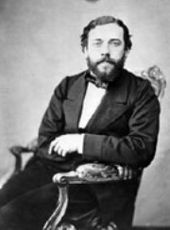Émile Durand
Émile Durand (born February 16, 1830 in Saint-Brieuc , † May 7, 1903 in Neuilly-sur-Seine ) was a French composer and music teacher.
After his first lessons with his father, Durand studied from 1845 at the Conservatory of Montpellier with Napoléon Alkan Solfège , with François Bazin harmony and with Jacques Fromental Halévy composition. In 1853 he received a Second Grand Prix de Rome for his cantata Le Rocher d'Appenzell based on a text by Edouard Monnais .
From 1850 Durand was professor of solfège at the Conservatoire de Paris . From 1871 he taught harmony as the successor to Bazin. Claude Debussy was his student here from 1877 to 1880 , who later dedicated his piano trio to him. In 1883 Durand retired from teaching.
Durand's most successful composition was the song Le Biniou based on a text by Hippolyte Guérin , which has been published in ever new instrumentations up to the present day. Comme à 20 ans based on a text by Emile Barateau became similarly popular . In addition, he published a number of music pedagogical works.
Works
- L'Elixir de Cormelius , Opéra comique, WP 1868
- L'Astronome de Pont-Neuf , musical attempt, premiered in 1869
- Sourires de Bretagne Fantasia for oboe, violin and clarinet with piano accompaniment, 1888
Fonts
- Traité d'harmonie théorique et pratique , 1881
- Traité d'accompagnement pratique au piano , 1884
- Traité de composition musicale , 1899
- Solfège élémentaire
- Solfège melodic
- Traite de transposition
Web links
| personal data | |
|---|---|
| SURNAME | Durand, Émile |
| BRIEF DESCRIPTION | French composer and music teacher |
| DATE OF BIRTH | February 16, 1830 |
| PLACE OF BIRTH | Saint-Brieuc |
| DATE OF DEATH | May 7, 1903 |
| Place of death | Neuilly-sur-Seine |
